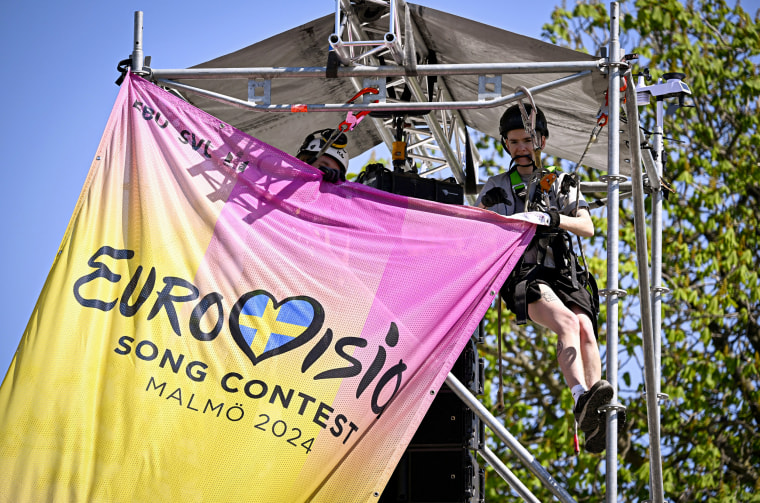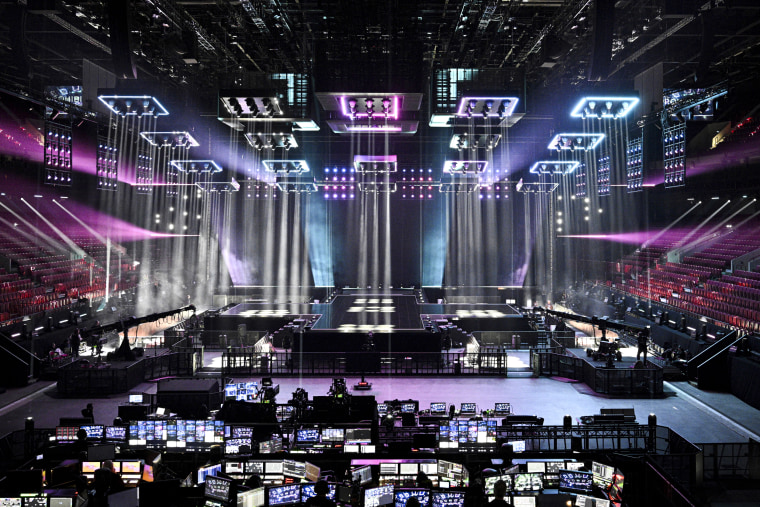This year, Eurovision will be held in Malmo, Sweden, and already fans are descending on the country’s third-largest city, decked out in sequins, glitter, skin-tight metallics or neon, some of them with their country’s flags painted on their faces or draped around their shoulders.
For fans, it’s a yearlong buildup to this weeklong party. For viewers across Europe and around the world, the contest will be shown over three days next week.
Artists from 37 countries across Europe and beyond will perform original songs — ranging from soaring power ballads to the bombastically ridiculous — to compete for the public’s vote, before a winner is chosen in a high-drama Grand Final.
The glittery, pyrotechnic-filled spectacle draws in around 160 million viewers, making it the world’s most-watched nonsports event — surpassed only by the Olympics and the World Cup.
In fact, Eurovision is often likened to the Olympics of pop music. Paul Jordan, a superfan who wrote his Ph.D. on the contest said: “They’ve got the spectacle of the opening ceremony. You’ve got the drama of the podium.”
“If you haven’t seen it, or heard of it, you’re probably living in a sad world,” Silvester Belt, this year’s entrant from Lithuania, told NBC News. “It’s the funniest and most awkward cringiest and fun event in the world. I don’t think there’s anything like [it].”

The first Eurovision was in 1956. Seven countries participated in what was essentially a technical experiment — national broadcasting organizations of the early TV era wanted to know if they could pull off a live, simultaneous, transnational broadcast. The show’s format was copied from a popular Italian song contest called San Remo, and evolved from there.
Eurovision proved to be a success, both technologically and culturally. Seven decades later, Eurovision is more beloved than ever, moving beyond TV to spawn a vast ecosystem of superfan blogs and social media accounts breathlessly covering its every development.
Today, Eurovision features most of Europe and some countries farther afield like Israel, Azerbaijan and Australia.
When is it?
First semifinal: Tuesday, May 7, at 3 p.m. Eastern.
Second semifinal: Thursday, May 9, at 3 p.m. Eastern.
Grand Final: Saturday, May 11, at 3 p.m. Eastern.
In the U.S., the shows are available to watch on Peacock.
How does it work?
Eurovision is divided into two semifinals and a Grand Final. 15 countries perform their song in the first semifinal, and 16 in the second. After each semifinal, viewers at home vote for their favorites, and the top 10 from each are put through to the Grand Final.
In total, there are 26 performances in the Grand Final: the winners of the semifinals, plus the host country (this year, Sweden) and a group called the Big Five — France, Germany, Italy, Spain and the United Kingdom — which enter the final automatically because their countries make the biggest financial contributions to Eurovision.
The winner of the Grand Final is decided by a combination of a popular vote from viewers and an official Eurovision jury.
Each artist only performs one song throughout the contest. The songs can be in any language, but are limited to three minutes. Lead vocals must be performed live and there cannot be more than six people onstage during the performance.
How to vote
Viewers at home can vote by phone, text or via the official Eurovision app.
Voters from countries participating in the contest can’t vote for their own act, but even fans from places that don’t take part in Eurovision can have their say. Voting in the app or on a website, viewers from around the world make up a “rest of the world” category that equals one participating nation. Once Eurovision is up and running, this website will become active and allow viewers outside Eurovision nations to vote: www.esc.vote.

For the final, viewers vote for their favorite out of the 26 remaining contestants, and the popular vote is combined with votes from juries of music industry professionals from each participating country.
Presenters, hamming up the anticipation in a drawn-out process, announce the juries’ votes country by country, building tension as a few acts take the lead.
Then the real drama begins with the reveal of the popular vote. As the popular votes are read out, the leaderboard can swing dramatically. In recent years, the jury and the public voted for different winners, meaning the act in the lead after the jury vote is in no way guaranteed to stay on top once the public has its say.
The winner is presented with a trophy and much glory for having won Eurovision. The country they represent will host the next year’s contest.
A variety of styles
Part of the joy of Eurovision is the sheer range of songs, often making for strange bedfellows with discordant musical styles performing back to back.
“Every single person on Earth can find something in Eurovision,” Belt, the Lithuanian singer, said.
Bambie Thug, this year’s entry from Ireland, calls their goth-inflected genre “Ouija-pop.” Their entry “Doomsday Blue” alternates between frantic growling and screaming and laid-back singing in the chorus.
Denmark’s Saba shows off her powerful vocals in “Sand,” a classic breakup ballad. The Czech entry, Aiko, sounds like her musical style was inspired by American pop–rock, while Austria’s entry is a Europop dance anthem that eschews subtlety with its title “We Will Rave.”
And then there are the off-the-wall entries that Eurovision is perhaps best known for, featuring inexplicable musical styling and staging.
Iconic performances of past decades have included a group of Russian babushkas, a Finnish heavy metal band dressed as monsters, and a bearded Austrian drag queen singing what could have been a James Bond theme song.
“I think that the majority is in it to win it,” Eurovision co-host Petra Mede said, but some countries focus less on sending a strong singer, and more on a memorable performance that will have people talking, providing a “spectacular entry. And they know that they’re not going to win, but they’re going to give us a good three minutes.”
“I think there’s a couple of quirky ones,” Jordan, the superfan who wrote a dissertation on Eurovision, said, inspired by last year’s runner-up, a chaotic performance called “Cha Cha Cha” by Finland’s Käärijä, who leapt around the stage in a puffy neon green outfit shouting “cha cha cha” between high-energy lyrics in Finnish about hitting the dance floor after a long week at work.
“I think there’s a few that have tried to emulate that success,” Jordan said.
He says “Europapa” by the Netherlands’ Joost Klein is one to watch. “It’s insanely catchy. It’s gone viral online. I can imagine people around Europe will be voting for that, they’ll be having parties, they’ll be loving it.”
Klein performs in a blue suit with exaggerated pointy shoulder pads, with backup dancers that include a person in a bird costume wearing an E.U.-logo tie.
“Rim Tim Tagi Dim,” by Croatia’s Baby Lasagne, is also drawing attention. The high-energy song about leaving the countryside for city life, is a buzzy way of putting a spotlight on the issue of Croatia’s brain drain.
Favorites to win
Winners of the contest come from all over the musical spectrum. In the past decade, successful genres have included pop from Sweden, jazz from Portugal, and rock from Italy.
Jordan says that unlike previous years where there were heavy favorites, “it seems to be really open this year. There doesn’t seem to be a runaway winner.”
Some to watch include Switzerland’s “The Code” by Nemo, which is about the singer’s journey of discovering their nonbinary identity, and Italy’s Angelina Mango. Her entry, “La Noia,” which translates to “the boredom,” is inspired by the cumbia music of Latin America.
The quirky Dutch and Croatian entries are also likely to be favorites with viewers at home, with splashy performances that can help them stand out in the crowded field.
The public and the juries often diverge on who they think should win, with votes from the jury tending to reward musical prowess while votes from the public are often swayed by spectacle.
Jordan says that Ukraine “can never really be discounted. They know how to stage a song,” and are the only country currently in the competition who have always gone through to the final from the semis. Ukraine has won Eurovision three times since it joined the contest in 2003, and the Ukrainian entry usually finishes in the top ten.
Legendary pop singers have emerged from the Eurovision gauntlet: Fifty years ago, then-little known Swedish band ABBA won with “Waterloo,” a song that has since entered the ranks of pop classics. In 1988, a young Celine Dion was launched into fame when she won for Switzerland with the song, “Ne partez pas sans moi.”
Regardless of whether this year’s artists will be the next ABBA, Jordan says Eurovision will endure, “it’s a format that’s so old now — nearly 70 years old, and yet it’s still surviving. And that’s amazing. Really, given all the changes in people’s viewing habits, Eurovision has really captured our imagination.”











